Lending Privilege
Note: This is the legacy version of the description of “Lending Privilege” for legacy references to the URL on my previous site. The version that is probably more up to date is here.
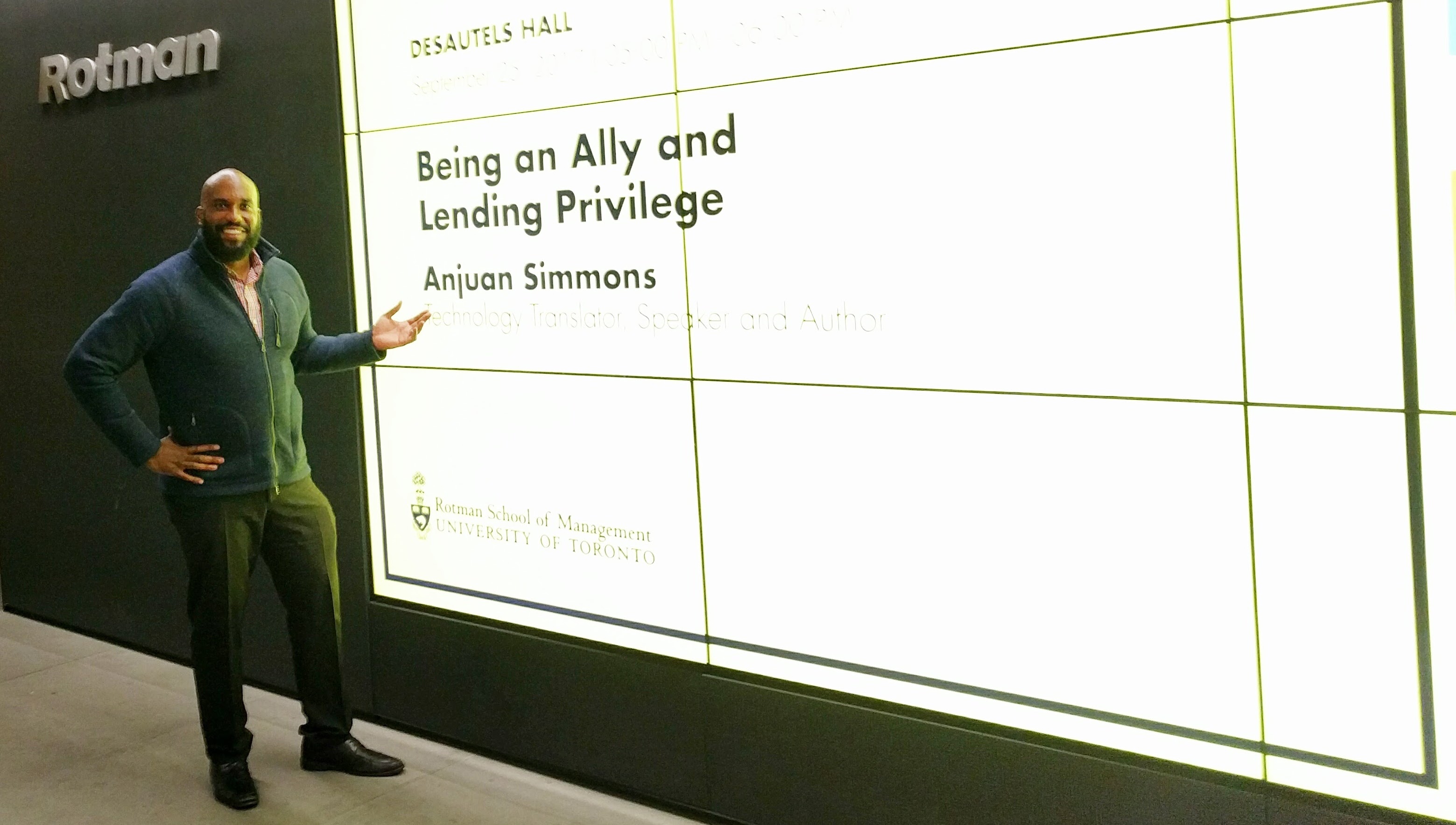
- Right before I gave my Lending Privilege talk at the Rotman School of Management on the campus of The University of Toronto.
Abstract
Diversity and inclusion have become hot topics, but you may not know how you can make a difference. This talk will help you understand that, no matter your background, you have some form of privilege and can lend it to to create a more fair and equitable world for everyone.
Description
Privilege is access to societal and economic benefits based on characteristics you possess. The most well understood forms of privilege are birth privileges like racial, gender, and physical privilege, but there are also selected privileges like religion, education, and career.
This session will teach attendees how to lend their privilege to their fellow technologists. They will learn the various types of privilege lending including credibility lending (where you provide visibility to someone without privilege), access lending (where you provide access to someone without privilege), and expertise lending (where you provide a voice to someone without privilege). These different types of privilege lending will be illustrated through well known examples and an explanation of how they can be applied to the technology industry.
Pitch
Although technology companies are trying to improve their diversity, I believe that change will only occur when individuals take action to make technology a more inclusive industry. I think that the concept of lending privilege can be a powerful tool that technology practitioners can use to expand the diversity of the industry.
Videos
Here are direct links to videos of me giving this talk at various conferences:
- The Lead Developer New York
- RubyConf
- GitHub Universe
- CraftConf
- QCon London
- DevOpsDays Boston
- DevOps Days Chicago (Ignite Talk)
- SpringOne Platform (Ignite Talk)
- GitHub CodeConf
Slides
I’ve given my “Lending Privilege” talk in multiple countries, and I have been very pleased to see it so well received by many in the tech community. A few people have recommended that I open source the talk so that other people can contribute to it so I have presented my slides and speaker notes in the table below. The speaker notes don’t include the content I tailor to specific events or the extemporaneous comments I often make on stage, but they are the baseline for every time I deliver this talk.
The photos I used for Bea, Elle, and Em came from the Women of Color in Tech Chat stock image repository. It’s a great source of inclusive stock photography for your presentations!
You can find the source for this page here. Pull requests are welcome.
| # | Slide | Speaker Notes |
|---|---|---|
| 1 | 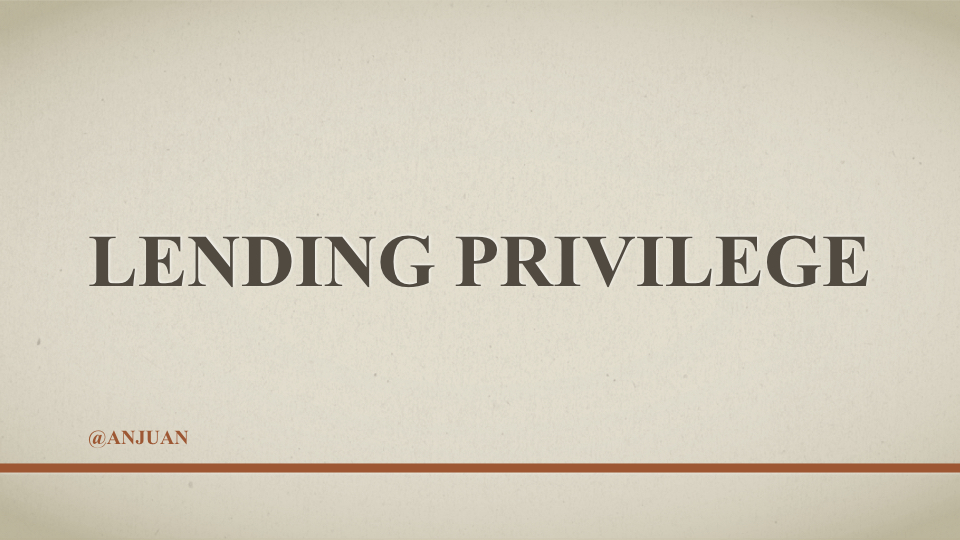 |
I’ve worked in software development for 20 years, and I sometimes think that diversity will fade as a topic in tech. I mean, are we still talking about this? But, something always happens. Someone writes about the extreme sexism they experienced at a large and well known tech company. Or, someone who works at another large and well known tech company goes in the opposite direction and writes a manifesto about why diversity in tech efforts are misguided. No matter where you are on the spectrum between these two points of view, I think the topic of diversity is here to stay. And, there are real problems. |
| 2 |  |
Technology companies are overwhelmingly homogenous and lack the balance you would expect based on the overall population. Also, benefits like pay, promotions, and positions of power are unequally distributed and, in fact, trend towards the dominant demographic. |
| 3 |  |
But, this isn’t a new problem. In fact, several years ago an actor on a television show faced a dilemma. He was one of the biggest stars of the show, but it wasn’t doing all that well in the ratings. However, that wasn’t the problem. This actor learned that an actress who also starred on the show wasn’t being paid as much as the other male actors. Since this actor was beloved by fans of the show, he had a lot of influence. This actor went to the studio executives and used his influence to demand equal pay for this actress. And it worked. The actress received pay equal to her male counterparts. |
| 4 |  |
The television show was “Star Trek”, the actor was Leonard Nimoy (who played Spock), and the actress was Nichelle Nichols (who played Uhura). That’s right, Leonard Nimoy was down with equal pay for equal work way before it was cool. Nimoy lent Nichols his privilege: his gender privilege as a male actor and his influence privilege with the fans. By lending her privilege, he furthered her position as an actress by giving her access to better pay. Now, you may be wondering what does this have to do with software development? The software industry suffers from a lack of diversity. Whether it’s open source or closed source, developing or deploying code, the people working in software development don’t represent the general population nor are rewards like pay, promotions, and positions of leadership equally distributed. We face the reality that a woman working today on a software development project may have less access to equal pay than an actress who worked on a failed TV show in the 1960s. Also, the danger of a non-inclusive technology industry are higher than ever as we build software that literally goes where we’ve never gone before. Artificial intelligence is amazing, but what if it’s weaponized to influence elections or attack power grids? I also think that the recent high profile examples of powerful men in tech harassing women is a diversity and inclusion problem. If we want to change the world, we first have to change ourselves. We need as many people as possible to help us create the future we want, but aspects of our industry keep people out. However, I believe that Leonard Nimoy provided a model for how we can address this problem. Notice that Nimoy didn’t wait for Paramount to create a Diversity Program nor did he wait for a better salary policy to be handed down from his superiors. Nimoy acted based on what he thought was the right thing to do. Nimoy lent Nichols, a fellow artist, the privilege that he had as a male actor and helped her participate in the financial benefits of his gender privilege. And I think that there are a lot of Leonard Nimoys in this audience. And, I also think there are other ways to lend privilege to make technology a more diverse and more inclusive industry. |
| 5 | 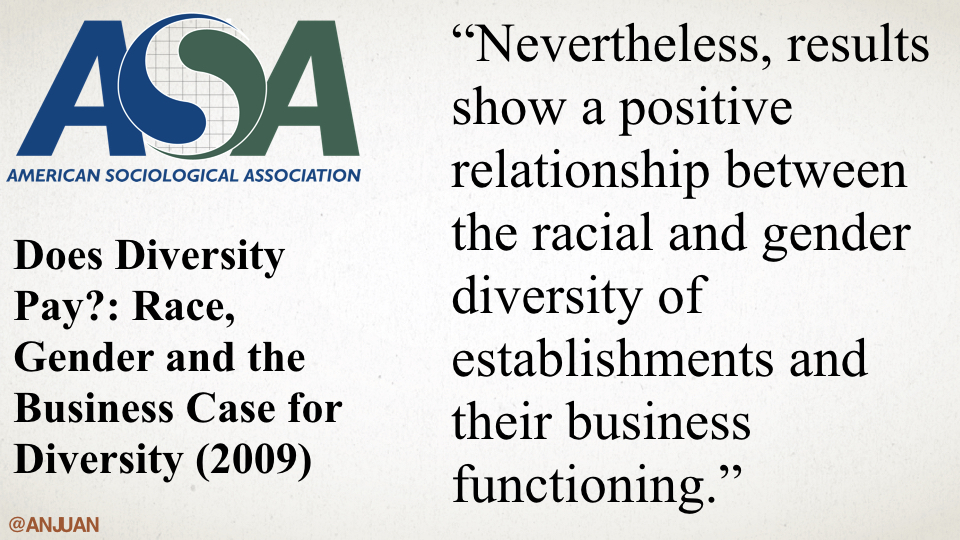 |
Not only did Nimoy foresee the value of equal pay for equal work, but he may have also foresaw what the ASA reported in 2009 about race, gender and the business case for diversity. This report found that having racial and gender diversity in a company led to positive business outcomes. |
| 6 | 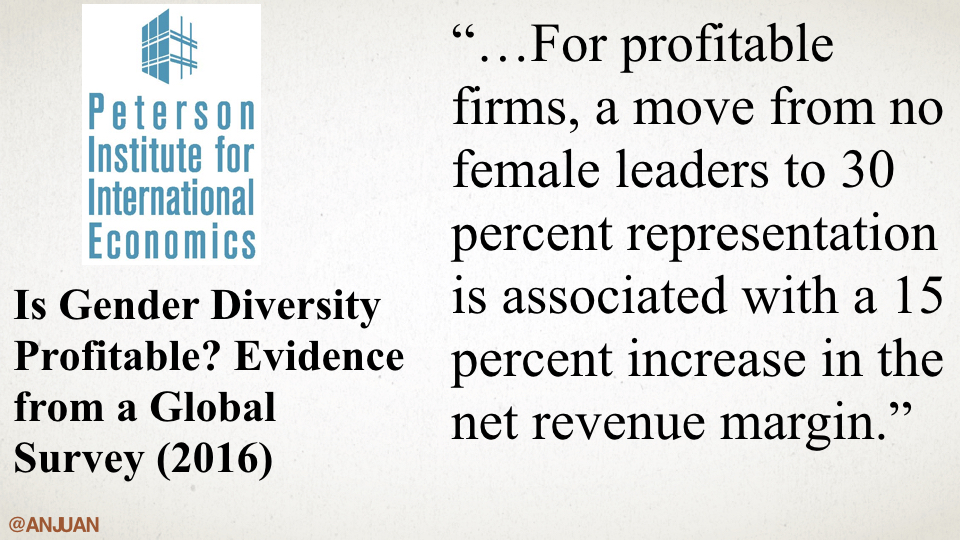 |
Or, maybe Nimoy foresaw this study of 22,000 firms in 2016 which found that having women in leadership positions generate more corporate revenue. The link between diversity and business value is clear, but we often can’t access this value because we block people without privilege from entering or staying in the technology industry. |
| 7 |  |
I’ve been using the term diversity, but we need to distinguish between diversity and inclusion. Let’s say you’re throwing a party. Diversity is sending invitations. You include your college friends, maybe a few folks from high school, or maybe a couple of colleagues from work. You just pop the invitations in the mail, and you’re done. It’s easy. |
| 8 |  |
Inclusion goes further than diversity. Inclusion means being extra nice to your guests who came a long way or providing nonalcoholic beverages to those who don’t drink. Inclusion requires empathy. Diversity just needs a stamp. Big companies will continue to play the diversity numbers game through their HR and Marketing departments. It’s important to remember that the HR department doesn’t exist to protect you. It exists to protect the company that funds it. We need a grassroots movement. We need to mobilize Leonard Nimoys throughout our industry. We can’t wait for tech companies to do this. |
| 9 | 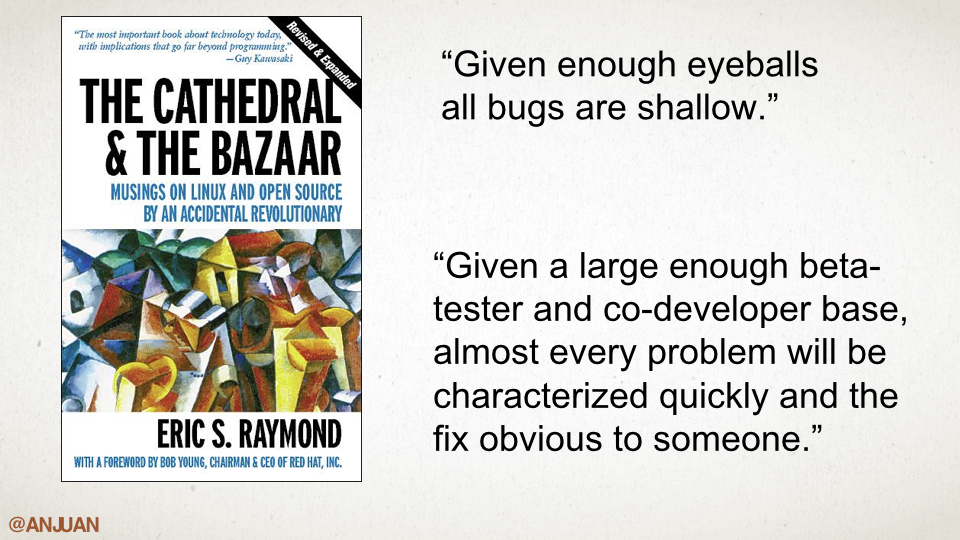 |
Since we work in tech, especially those of us who contribute to open source software projects, we understand grassroots movements. One of the first books on open source software was The Cathedral and the Bazaar by Eric S. Raymond. In this book, Raymond explored the miracle of Linux. Most of us don’t really think about it much now, but Linux was this crazy project that let everyone contribute to taking this complicated kernel and creating a useful operating system. And it worked! Raymond began to use the principles of open source software in his own software development projects, and he distilled lessons that he used to write his book. Raymond likened closed source software development to a cathedral where there is centralized command and control, and he compared it to open source software which he described as a loud babbling bazaar where power is distributed among many loud voices. And, spoiler alert, the bazaar model produced better results. The lesson that is most well known from “The Cathedral and the Bazaar” is this one: “Given enough eyeballs all bugs are shallow”. Now, I hope that many of you have heard this phrase, but I want to focus on the more formal version of this statement from the book which reads of follows: “Given a large enough beta-tester and co-developer base, almost every problem will be characterized quickly and the fix obvious to someone”. Raymond would probably disagree with me, but that is a statement of inclusion. Raymond linked the size of the co-developer base to problem solving. And what else is innovation other than the ability to solve a problem? If we let software development be this big tent, this babbling, boisterous bazaar of people who are involved in the development of software and dedicated to making it better, then there is no problem that we can’t solve. And that’s the promise of inclusion. But the sad reality is that just like our repositories are protected by by passwords and permissions, often our companies are protected by privilege and there are voices that we keep out of this bazaar. We don’t create a space for them to take part in our projects and in our companies. Certain groups have a hard time lending their voices to the babbling bazaar that Raymond described because they lack privilege. This is tragic, because, whatever problem you have within your company, within your source code, or within your deployment process, someone out there can fix it. But, they are often… |
| 10 | 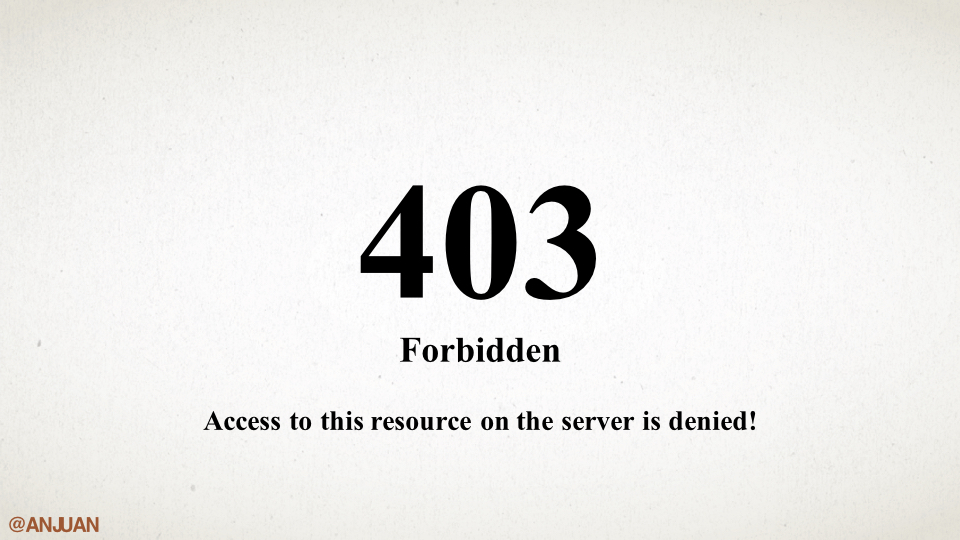 |
…denied entry into our companies. To understand how this works and what we can do to make things better, we have to understand privilege. But before we do that, it’s really important that we understand what privilege is not. |
| 11 |  |
Having privilege doesn’t mean you haven’t worked hard or that everything is easy for you. It’s like riding a bike up a hill. You’re pedaling hard, sweating, and you might have a cramp in your right leg. But, there are other people also riding up that hill . . . |
| 12 |  |
And they face obstacles that you don’t even see. These are obstacles that you don’t even have to worry about. And not only does privilege allow you to not worry about these obstacles, it also gives you benefits. |
| 13 |  |
And, now that we know what privilege is not, we can talk about these benefits of privilege. In fact, we can create a working definition of privilege. Privilege is simply access to benefits based on traits you possess. These benefits could be schools, jobs, social circles, leadership roles and wealth. But there are other benefits. Like the benefit of being pulled over by the police and not worrying if your skin color may lead this to being the last drive you ever take. Or, the benefit of being seen at a bar with your partner by a co-worker and not worrying if your fellow sysadmins will judge you for your relationship decisions. Or, the benefit of not worrying if your hearing aid malfunctions during work, and someone thinks you’re a risk to the infrastructure team. Or, the benefit of not having to change your clothes multiple times in the morning because someone may question your capabilities as a technologist simply because you happen to be dressed a certain way. This last example shows the reality that women are hired to fill two roles in tech companies. The role they were hired to do and the role of fighting the stereotypes that people have of them. And this second role is exhausting. Why don’t we just let women do their jobs without the burden of sexism and misogyny? I think lending privilege can help do this. There are two major categories of privilege. |
| 14 |  |
There are birth privileges which come from the two people who made you. These include your race, gender, base level of physical ability and basically everything else we usually use to discriminate against people. |
| 15 | 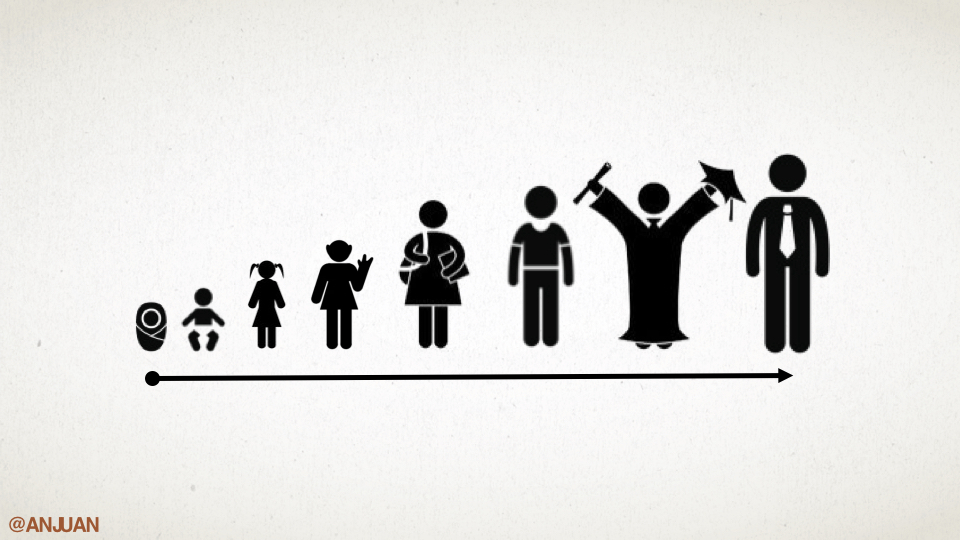 |
Then there are selected privileges which include religion, education, your career and everything else that can be easily maxed out by having access to a trust fund. |
| 16 | 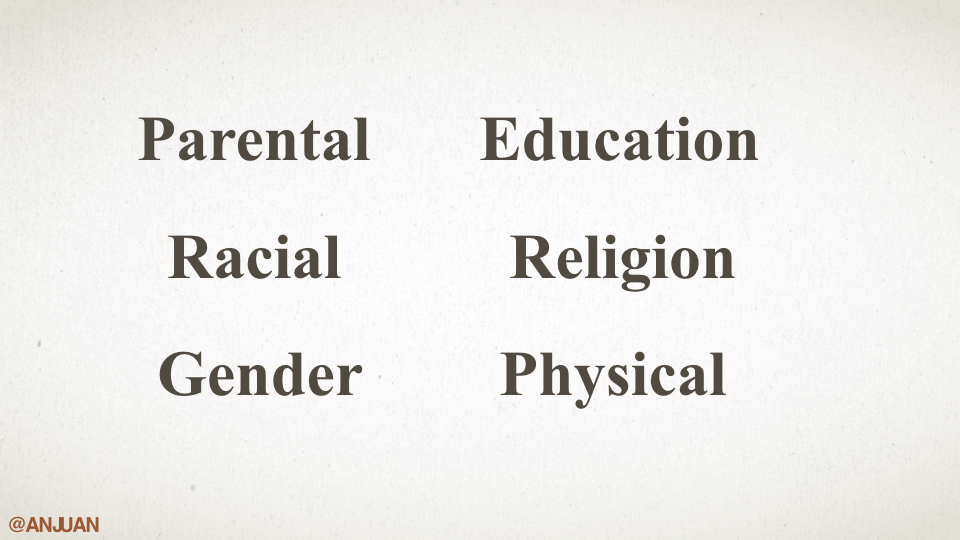 |
Your birth privileges and selected privileges make up your portfolio of privilege. Some of you have all of these privileges but almost everyone has at least one. Look up here and find your privileges. Some of you have many of them, but focus on at least one privilege in your mind. Now, think about what your career as a software developer would be if you started out without that privilege. What if you started your career without your gender privilege? Or, without your racial privilege? Or, without the privilege of going to Stanford or MIT? Or, if you didn’t even have he privilege of being able to walk around, or see, or hear? How much harder would your journey through tech be without you privilege? Now, think about the people in tech, some of whom you work with every day, who are less privileged than you and have to navigate their careers at a significant disadvantage. |
| 17 |  |
You can help remove these disadvantages by lending your privilege. I want to illustrate three types of privilege lending through three women. I’ve made up names for them, but I’m sure that they are very similar to people you work with every day. Let’s call them Bea, Elle, and Em. For each illustration of lending privilege, I’ll describe the type of privilege, share an example of how it works, and then show how you can do it. |
| 18 |  |
Credibility lending is providing visibility to someone without privilege. LGBT people often feel restricted in tech because of the heteronormative nature of the tech industry. By lending credibility, you can help them show the amazing things they’re already doing in software development. |
| 19 |  |
Here’s the example. A few months ago, Stephen Colbert invited DeRay McKesson to his talk show. Colbert switched seats with DeRay in a demonstration of credibility lending. DeRay gained the powerful platform of Colbert’s chair which raised his profile. That’s how credibility lending works. |
| 20 |  |
So, how can you lend credibility in your tech company? Consider Bea who finished that killer feature in your next release way before anyone thought it was possible. But, no one on the executive team even knows her name. In fact, when she’s working late, they often think she’s part of the cleaning crew. When you get another chance to present to the executive team, why not let someone who doesn’t have your privilege give the presentation? Give them a chance to let their light shine. |
| 21 | 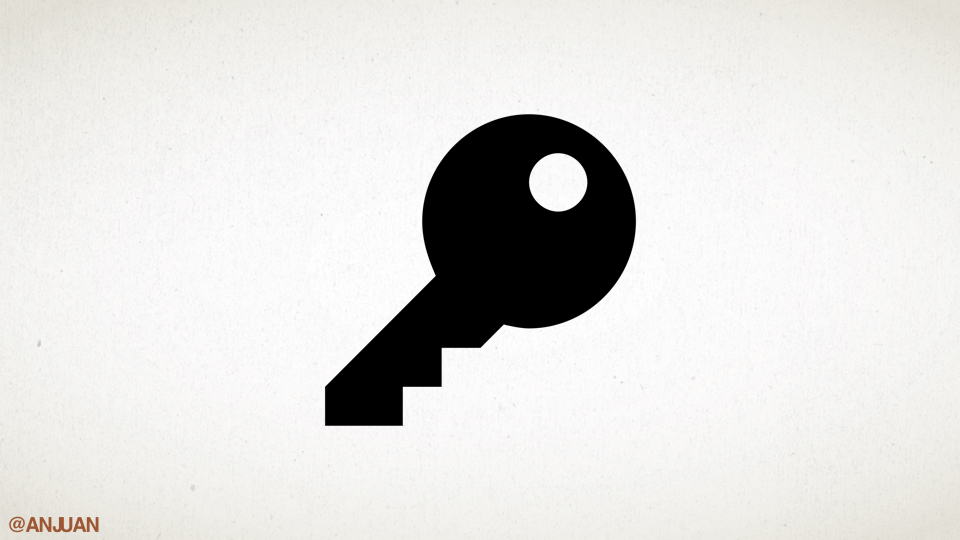 |
Access lending is providing entry for someone without privilege. Often, women in tech experience sexism due to their lack of gender privilege. This often leads them to doubt their own abilities despite the tremendous value that women bring to tech companies. I think access lending can be a powerful technique to fix this. |
| 22 |  |
Here’s the example. Tracy Chou, a noted activist who works to make the technology sector more inclusive, once described how one of her Stanford professors insisted that she become a TA for a CS class. Tracy resisted because she thought she wasn’t qualified to be a TA. After all, she often overheard her male peers brag about how easy the homework and lab assignments were, but she was struggling. Well, by becoming a TA, she saw the grades of her male colleagues, and she was doing just as well as they were. This access helped her see that she had the ability to be successful in tech. |
| 23 |  |
How can you lend access at your company? When your company decides who goes to conferences like this, why not send someone who doesn’t have your privilege? Elle spent the last few weeks making implementing a better debugger. Why not send someone like her to a tech conference instead of yourself? I mean, isn’t this like your third time attending this conference? By sending people without your privilege to events like this, you make their place in tech seem that much more real. You also enrich these events with different perspectives. |
| 24 |  |
Expertise lending is providing a voice to someone without privilege. People of color often feel that we don’t have a voice in tech companies because we lack the racial privilege most tech leaders possess. We don’t see ourselves on tech magazine covers. And while things are getting better, we don’t often find people like as at conferences like this one. I believe that expertise lending can help fix this. |
| 25 |  |
Here’s the example. Former First Lady Michelle Obama was in Austin during South by Southwest a couple of years ago and gave a great example of expertise lending during her keynote. She said, “If you’ve got a voice at the table, ask: Is there diversity around the table? Are there voices and opinions that don’t sound like yours?” |
| 26 |  |
How can you lend expertise? When your boss has a plush project that needs a manager, why not let someone else without your privileges have a chance to lead it? We’ve all seen these projects. They’re the ones that you know, if you pull them off, they will look great during performance reviews. Why not let someone like Em who everyone on your team loves working with lead that project? She’s a one person onboarding team, she always help answer questions in Slack, and she writes the cleanest code in the company. By giving her the opportunity to operate at the next level, you improve her odds of not only staying at your company but advancing to help lead it. |
| 27 |  |
So, those are three examples of how to lend privilege. It’s really quite easy. In fact, I’m sure you’ve thought of other examples yourself. Lending privilege doesn’t mean you lose anything. You just share your benefits with others and, by doing so, you can help make tech truly be a meritocracy where all talents are welcome no matter how they’re packaged. |
| 28 |  |
I spoke at a conference where Common performed a benefit concert for Black Girls Code. Common has a lot of hit songs, but I really like Glory. The song was co-written with John Legend for the movie Selma. This is the chorus: |
| 29 | 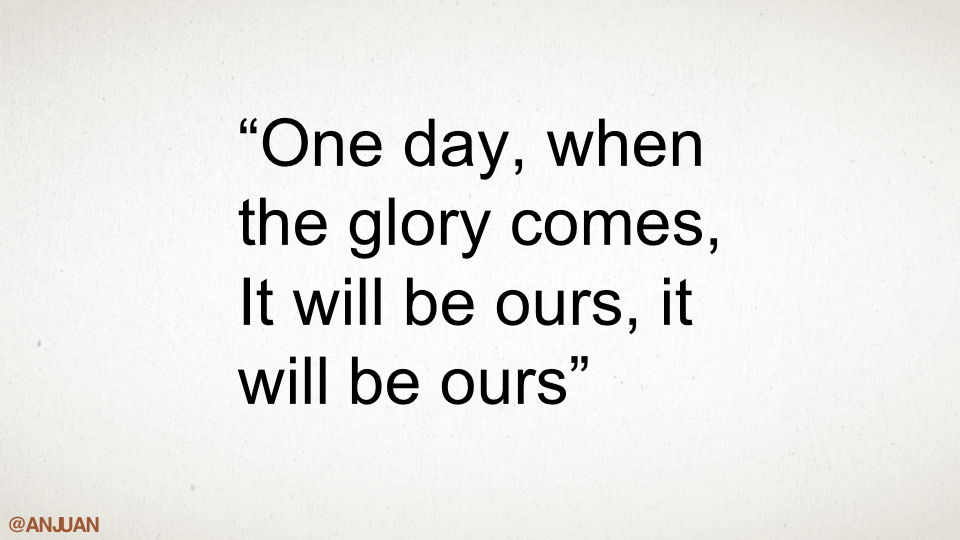 |
“One day, when the glory comes, it will be ours. It will be ours.” And, I like that verse because it captures the essence of why diversity and inclusion work is so important. We had an election in 2016 where the father of a fallen solider offered to lend one of the candidates his copy of the Constitution. The ACLU offered anyone who completed the form to get their own copy. I did so and received my copy. Now, I haven’t read the Constitution since high school, but it holds up. Article 1 (Congress) has been problematic for a while. Article 2 (Executive Branch) is really, different right now. Article 3 (Supreme Court) is one most people forget exists. But, I really liked the Amendments. I realized that the Founding Fathers implemented a pull request system in the Constitution. You can propose changes, have them reviewed, and then merged into production. It’s a messy process which may explain why it’s only been done 27 times in more than 200 years, but it works. Let’s take the 13th Amendment. Many people think that this amendment outlawed the enslavement of Black people, but it doesn’t say that. The 13th Amendment states that no one can be a slave in America. So, as the descendent of Black slaves, I’m sure that my ancestors celebrated the passage of the 13th Amendment, but every American should have celebrated because they lived in a country that was truly the land of the free. When the 17th Amendment which gave women the right to vote was passed, I’m sure women rejoiced at being let into the franchise. But, every American should have celebrated living in a country where gender was no longer a barrier to the ballot box. And leaving the Amendments, when the Supreme Court a few years ago ruled that same-sex marriage simply marriage, then I’m sure the LGBTQ community welcomed that ruling. But, we should all have applauded the court for creating a country that didn’t put limits on love. This country has tried to address the long injustices done to Blacks, women, and LGBTQ people throughout our history. I think that Lending privilege can help the tech industry solve our own peculiar problems. Diversity and inclusion in tech doesn’t mean that women win, or LGBTQ people win, or Black people win. It means we all win because we work in an industry where we don’t put any limits on talent. |
| 30 | 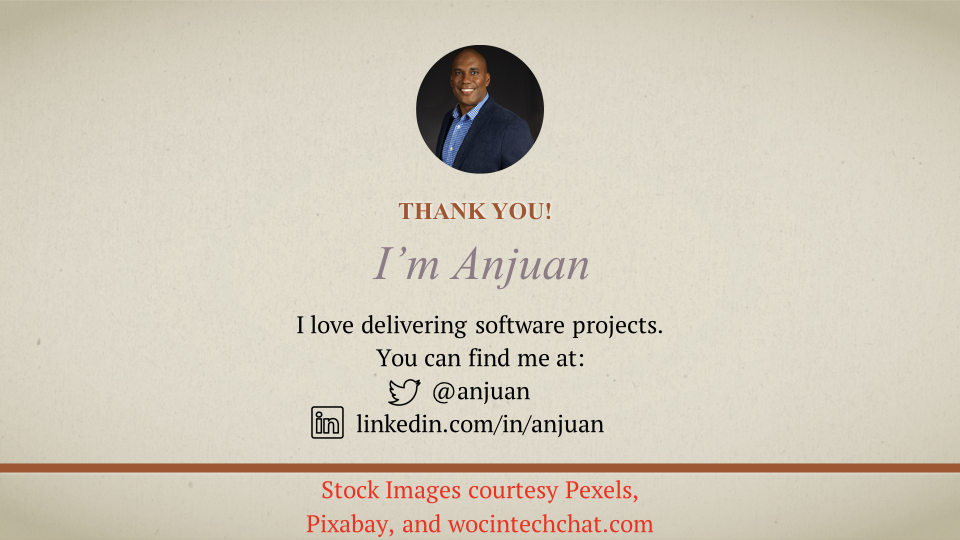 |
Now, I know that some of you may be unconvinced that diversity and inclusion are things that you should care about. You may think, “Hey, I’m just here to ship code”. And, I get that sentiment. However, while I don’t have any proof, I’m sure that when Leonard Nimoy when into the offices of the studio executives that some of them wondered what does paying a black woman have to do making a Sci-Fi TV show? And I think that if Leonard Nimoy was posed that question he would respond that it has everything to do with making a Sci-Fi TV show. Because the man who played a character that truly symbolized the power of infinite diversity in infinite combinations had to believe that there is power in creating an environment where everyone is welcome to bring their ideas, their talents, their perspectives, and their passions to making art. So, I hope that as you build the art of your tech, you, too, will understand that if we want women, people of color, LGBT people, and other marginalized groups to not only enter the technology sector but stay and get promoted, if we want that boisterous bazaar where no bug is deep, if we want to increase the business value of our companies by making them diverse and inclusive, then we all have a role to play by lending our privilege. Thank you. |
What Attendees Have Said
@anjuan just gave one of the most important talks at #CraftConf, about lending your privilege 👏🏻 - Leigha Mitchell
Anjuan Simmons - Lending Privilege. Entire talk. Speaker with a fantastic ability to tackle tough and sensitive subjects with honesty, grace and respect. - CraftConf Attendee
Anjuan Simmons’ talk on Lending Privilege was a real highlight, and started a lot of discussions in our sysdev-team which I think will really help us make our workplace more inclusive. - CraftConf Attendee
@anjuan giving a fantastic talk on privilege and privilege lending at @devopsdaysbos so many insights and so much food for thought - Peter Nealon
loving @anjuan talking about practical ways to lend privilege: credibility, access, and more. difference between diversity and inclusion - Elliot Murphy
Great session on lending privilege by @anjuan at @devopsdaysbos! Check out his Twitter feed! - Trigg Bowlin
@anjuan 👏 great talk on lending privilege at #devopsdaysbos. it’s time we got past talk of diversity and deeper into inclusion and empathy - Sarah Zelechoski
Great session by @anjuan on lending privilege. It’s not just morally right, it helps deliver better software and processes. #DoDBos16 - Devin
I really enjoyed the next trio of talks. First up was Anjuan Simmons about Lending Privilege. What he meant by this was to work not only toward building up diversity in your organization, but also factoring in inclusion. His talk stressed the importance of what people in the majority populations in tech can do to help minorities, including lending them your credibility, helping them with access to the tooling and levels of trust they have, encouraging them in their roles and sharing of expertise. On a personal note, I’ll emphasize that it’s easier to be a mentor to people who you share a background, race and gender with, which results in minorities struggling to find mentors. We must do better than what is easy and work to mentor people who are different than we are. - Elizabeth Krumbach Joseph
…really changed my understanding of the power of a network - Michael Hedgpeth
.@anjuan has a great talk on Lending Privilege! I encourage folks to listen. Practical easy to implement strategies to start - Qiana Patterson
Truly extraordinary & eye-opening talk by @anjuan at #CodeConf about lending privilege. - Parker Moore
@anjuan that was an amazing talk and thank you for giving people solid examples of lending privilege I would not be here if people didn’t - Aimee Maree
@anjuan just game a stellar Ignite on lending privilege - Duane O’Brien
Lending Privilege by @anjuan at Ignite #OSCON is <3 Using your birth + selected privilege to support others. Can’t wait to share this video. - Josh Simmons